Many they kept kicking them and beating them just for no reason to scare us and some they undressed them totally.
| 04.06.2022 | Nea Vyssa | josoor | 41.5863678, 26.5428404 | Greece | Turkey | yes | yes | yes | yes | no | no | no | 5 - 55 | 70 | Afghanistan, Syria, Morocco, Algeria, Sudan | detention, no translator present, denial of food/water, personal belongings taken, overcrowding | 34 | beating (with batons/hands/other), kicking, pushing people to the ground, insulting, water immersion, sexual assault, threatening with guns, forcing to undress, theft of personal belongings, reckless driving | 3 men in sage green uniforms with “police '' written in them yellow, a logo on the sleeve and police written above it; 3 men in deep blue uniforms, with police written on front & back in Greek; 1 white car with a blue stripe on the side, and “police” marked on the side of it,; 1 green jeep; 1 unmarked white van; 7 uniformed men in sage green jackets and trousers, and black boots; 1 big white Mercedes van; 4 men in camouflage jackets, civilian trousers, and white and black trainers; 2 men in deep blue uniforms and trousers, with “police” written in white on left chest, & a flag resembling the Greek flag on arm, 10 uniformed men wearing balaclavas, holding sticks & in civilian clothes, either black coats or green coats, and jean trousers or sports trousers, others wearing sage green jackets and trousers; 2 men in uniforms similar to Greek military, 2 men in black uniforms with no insignia, wearing balaclavas; 2 men in civilian clothes wearing balaclavas (speaking Arabic, Syrian dialect); multiple firearms |
The respondent is a 26-year-old male from Morocco. He stated that before this pushback, he had experienced four other pushbacks in total - three from Greece and one from Bulgaria. This pushback was from Nea Vyssa, Greece to Turkey. At 6 p.m. on 05/04/2022 he left with one friend, a 27-year-old man also from Morocco, from Edirne to Karaağaç. They walked for three hours to get close to the border fence, and at about 9:30 p.m. they crossed into Greece. After crossing the border they immediately ran across some farmland for almost two kilometres until they arrived at a paved road. They crossed over this road and continued walking, stopping only from time to time to rest for five minutes and smoke. They arrived near Valtos and by this time it was light. They hid between a dry river and a tree because was an open area surrounded by farmlands with a paved road nearby and a crossroad up ahead where they could see many cars passing, recalled the respondent. While checking the road, the respondent's friend suddenly told him that a civilian car had slowed down but then continued driving. The respondent described the car as a grey Volkswagen Golf. The respondent stated that soon after they fell asleep, at around 09:00 a.m., they were awoken by five men in uniforms assaulting them. They had fallen asleep for only about 10 minutes. When they were woken, someone was kicking them and another man grabbed the respondent’s friend's foot and kept pulling him; the men kept kicking the respondent and hitting them with a plastic baton, described the respondent. He stated that the group was beaten at random points on their bodies for approximately 10 minutes. After they were beaten, the uniformed men reportedly forced them to walk to where they were parked on the road for three minutes, asking the respondent and his travelling companion,“where are you from?”, “how did you cross?”, “where did you cross?”, “are there any others?”. The respondent stated that they were spoken to in English and the only languages they heard these men use were Greek and English.
“They kicked us and beat us, then asked us to give our phone and when he asked me from where I am. I told him I am Syrian. Then, he kicked me on my shoulder”.When asked to further describe the violence he experienced, the respondent replied:
“No they do that for purpose or no purpose, they will keep kicking you. [...] I only said when they were kicking us, ‘No staying in Greece asylum camp and go to Europe.’ [...] He ignored me and keep kicking me.” The respondent added that while he was being beaten, he stated that he wished to claim asylum, but “they kept kicking us”.The respondent stated that none of their documents were checked at this point. The respondent described the uniforms of the men: three were wearing sage green uniforms, with “police” written in yellow on them and a logo on the arm with 'police' written above it, and two were wearing deep blue uniforms with 'Police' written in the front and on the back in Greek. The respondent identified the men's uniforms as matching the uniforms displayed in Image 1. [caption id="attachment_20200" align="alignnone" width="600"]
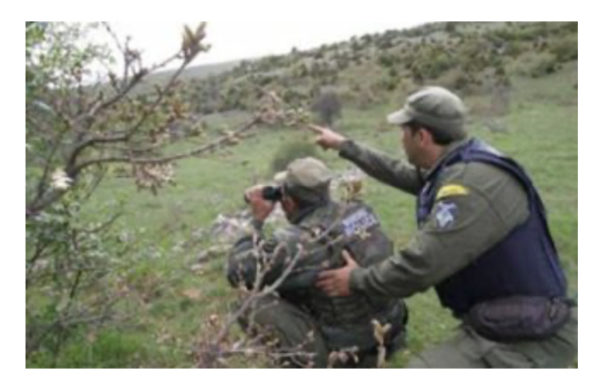 Image 1 Backs of jackets of Greek Border Guard[/caption]
The respondent stated that each of the men was carrying a weapon. One of the men wearing the blue uniform held a firearm, while one of the green-uniformed men held larger firearm. The others, he recalled, had their firearms in their holsters. He said that he did not really know much about firearms but was confident that he could identify the guns if shown options. He stated that they larger fire arm matched Image 2.
[caption id="attachment_20197" align="alignnone" width="496"]
Image 1 Backs of jackets of Greek Border Guard[/caption]
The respondent stated that each of the men was carrying a weapon. One of the men wearing the blue uniform held a firearm, while one of the green-uniformed men held larger firearm. The others, he recalled, had their firearms in their holsters. He said that he did not really know much about firearms but was confident that he could identify the guns if shown options. He stated that they larger fire arm matched Image 2.
[caption id="attachment_20197" align="alignnone" width="496"]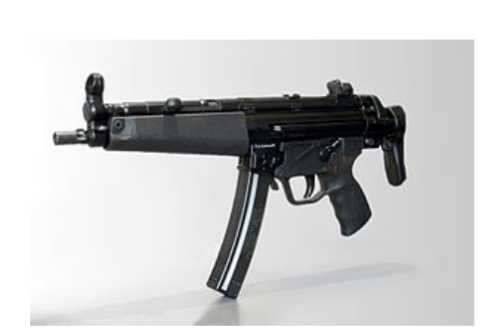 Image 2 Heckler & Koch MP5, which were held by men wearing sage green uniforms [/caption]
The vehicles that these men had travelled in were described by the respondent as being one white car with a blue stripe on the side, and “police” marked on the side of it, and the other was a green olive coloured land cruiser that had no writing on it. He further identified these cars as similar to image 3 and Image 4.
Image 2 Heckler & Koch MP5, which were held by men wearing sage green uniforms [/caption]
The vehicles that these men had travelled in were described by the respondent as being one white car with a blue stripe on the side, and “police” marked on the side of it, and the other was a green olive coloured land cruiser that had no writing on it. He further identified these cars as similar to image 3 and Image 4.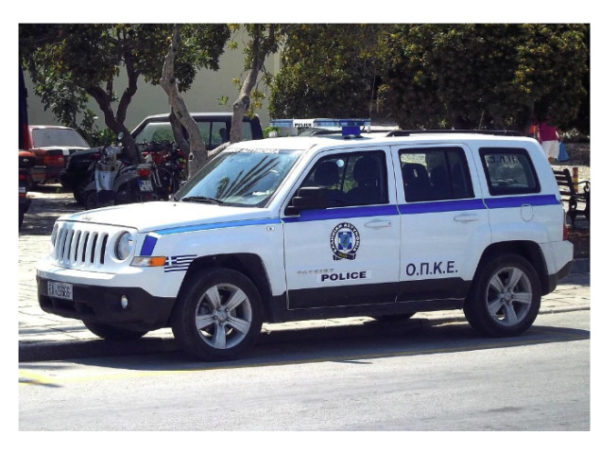 Image 3 - Greek Police Jeep
[caption id="attachment_19991" align="alignnone" width="474"]
Image 3 - Greek Police Jeep
[caption id="attachment_19991" align="alignnone" width="474"]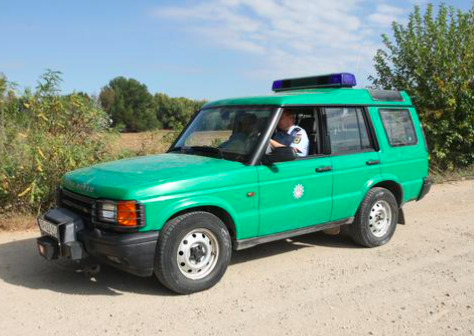 Image 4 Frontex patrol car near (however no Frontex presence was confirmed by the respondent - and this car model and make was the same as what was in the pushback).[/caption]
The respondent stated that they stayed at that point for about 30 minutes. Then a white van, unmarked, came and the respondent and his friend were laoded into it. He stated that he could not see the number plate of the vehicle, but further noted it could be,“Any brand Splinter or old Mercedes van.” He could not see how many officers were present in the vehicle. They were reportedly driven fast on paved roads for about 15 minutes and could only see outside through a a small hole on the side of the truck.
After 15 minutes, the van stopped stopped at a detention site. The group were unloaded from the truck and saw they were by a building. This building was described by the respondent as a one-storey abandoned building with old walls, and a small yard in front of the entrance door that led to a corridor and some cells. The van left the detention site after they were removed.
Outside the building, there was one other big white Mercedes van parked in front and nearby were some caravans and locals' houses, but not many. The respondent did not see any official signs of Greek police or military on the building. There was only a flag resembling the Greek flag on the fence that surrounded the building. The respondent described there were seven men in uniforms present at this location.
These uniforms were described by the respondent as being sage green jackets and trousers, and black boots, with 'police' written in yellow on the left side of the chest and a logo coupled with a yellow stripe on the shoulder. The description matches the uniform worn by It was the same as the Greek border guard’s uniforms .
Two men came to conduct a search of the respondent and his friend. “If we don’t understand what they are saying, they immediately slapped us” explained the respondent. This took place in the yard by the building. They were forced to undress here - trousers, shirts and jackets were removed. They were frisked and body-searched for about 10 minutes, recalled the respondent. The men returned these items of clothing, but their backpacks and shoes were taken from them and not returned.
At 11 a.m., they were taken inside the building, to a cell, which was approximately five by three metres. According to the respondent, it was a small room, there were metal bars on one side, and a metal door locked from outside. The cell was dirty, the floor was covered with what the respondent explained was “mud”. There were four bunk beds inside this cell with no mattresses or covers. There was an old wall with names written on it. The cell smelled very bad and there was a dirty toilet inside.
At this point, there were only 20 people inside this cell, including the respondent and his friend, but more were regularly brought throughout their detention. In total, they were detained for approximately nine hours, without food or water. Eventually there were 70 people detained in the cell, from Syrian, Sudanese, Moroccan, Algerian, and Afghan people aged between five and fifty-five. There were also three women and more than eight minors under the age of 17 years old.
According to the respondent, he was not required to sign anything, there was no translator present, and no fingerprints or photos were taken. After nine hours, some officers wearing green camouflage jackets, civilian trousers, and white and black trainers, came and took the group from the cell and transported everyone to the river. He further described that all officers were wearing balaclavas and were armed with wooden batons. Their clothing did not have any writing or other details to indicate who they were.
As people were forced to leave the cell, everyone was hit on their backs by the officers. The respondent recalled that he was positioned among the last people leaving. The women and minors were also beaten, he noted.
When they reached outside to the yard, there were about 15 men. They were wearing different uniforms to the ones previously mentioned: two were wearing deep blue uniforms and trousers, with “police” written in white on their left chest, and a flag resembling the Greek flag on the arm; 10 of the men were wearing balaclavas holding sticks and in civilian clothes, black coats or green coats, and jean trousers or sports trousers; all the others were wearing sage green jackets and trousers, with one of them wearing a balaclava. The green uniforms were identified by the respondent as the same as Image 5.
[caption id="attachment_20191" align="alignnone" width="600"]
Image 4 Frontex patrol car near (however no Frontex presence was confirmed by the respondent - and this car model and make was the same as what was in the pushback).[/caption]
The respondent stated that they stayed at that point for about 30 minutes. Then a white van, unmarked, came and the respondent and his friend were laoded into it. He stated that he could not see the number plate of the vehicle, but further noted it could be,“Any brand Splinter or old Mercedes van.” He could not see how many officers were present in the vehicle. They were reportedly driven fast on paved roads for about 15 minutes and could only see outside through a a small hole on the side of the truck.
After 15 minutes, the van stopped stopped at a detention site. The group were unloaded from the truck and saw they were by a building. This building was described by the respondent as a one-storey abandoned building with old walls, and a small yard in front of the entrance door that led to a corridor and some cells. The van left the detention site after they were removed.
Outside the building, there was one other big white Mercedes van parked in front and nearby were some caravans and locals' houses, but not many. The respondent did not see any official signs of Greek police or military on the building. There was only a flag resembling the Greek flag on the fence that surrounded the building. The respondent described there were seven men in uniforms present at this location.
These uniforms were described by the respondent as being sage green jackets and trousers, and black boots, with 'police' written in yellow on the left side of the chest and a logo coupled with a yellow stripe on the shoulder. The description matches the uniform worn by It was the same as the Greek border guard’s uniforms .
Two men came to conduct a search of the respondent and his friend. “If we don’t understand what they are saying, they immediately slapped us” explained the respondent. This took place in the yard by the building. They were forced to undress here - trousers, shirts and jackets were removed. They were frisked and body-searched for about 10 minutes, recalled the respondent. The men returned these items of clothing, but their backpacks and shoes were taken from them and not returned.
At 11 a.m., they were taken inside the building, to a cell, which was approximately five by three metres. According to the respondent, it was a small room, there were metal bars on one side, and a metal door locked from outside. The cell was dirty, the floor was covered with what the respondent explained was “mud”. There were four bunk beds inside this cell with no mattresses or covers. There was an old wall with names written on it. The cell smelled very bad and there was a dirty toilet inside.
At this point, there were only 20 people inside this cell, including the respondent and his friend, but more were regularly brought throughout their detention. In total, they were detained for approximately nine hours, without food or water. Eventually there were 70 people detained in the cell, from Syrian, Sudanese, Moroccan, Algerian, and Afghan people aged between five and fifty-five. There were also three women and more than eight minors under the age of 17 years old.
According to the respondent, he was not required to sign anything, there was no translator present, and no fingerprints or photos were taken. After nine hours, some officers wearing green camouflage jackets, civilian trousers, and white and black trainers, came and took the group from the cell and transported everyone to the river. He further described that all officers were wearing balaclavas and were armed with wooden batons. Their clothing did not have any writing or other details to indicate who they were.
As people were forced to leave the cell, everyone was hit on their backs by the officers. The respondent recalled that he was positioned among the last people leaving. The women and minors were also beaten, he noted.
When they reached outside to the yard, there were about 15 men. They were wearing different uniforms to the ones previously mentioned: two were wearing deep blue uniforms and trousers, with “police” written in white on their left chest, and a flag resembling the Greek flag on the arm; 10 of the men were wearing balaclavas holding sticks and in civilian clothes, black coats or green coats, and jean trousers or sports trousers; all the others were wearing sage green jackets and trousers, with one of them wearing a balaclava. The green uniforms were identified by the respondent as the same as Image 5.
[caption id="attachment_20191" align="alignnone" width="600"]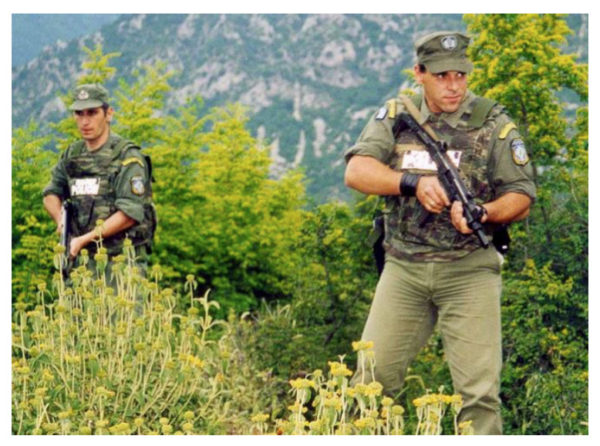 Image 5: Green-uniformed Greek border guards, with one wearing a balaclava.[/caption]
“They kept beating us as they loaded us into the vans”, recalled the respondent. They were beaten for three seconds to get the group to move fast. Here, again, the minors and women were reportedly beaten too.
The respondent described being loaded into the trunk of the same van that had brought them to the detention site, stating that “there were no licence plates on the back.” In total, there were 35 people loaded into the trunk of the van. Inside the van it was difficult to breathe. The door of the trunk was locked and there were no lights. The respondent described how the “The women were freaking out”. The respondent explained that he did not know how many people were put in each vehicle, but the entire group was loaded into vehicles and removed from the detention site.
The drive lasted for about 15 minutes along unpaved roads and they could not see outside. The driving was fast and horrible, “We couldn’t stand still”. The respondent was convinced the driver was driving like this on purpose, “When he run fast they drift suddenly, then we hit each other's heads”.
The respondent described the place where they all arrived after the drive, and from where they would be pushed back. It was a forest and there was a small yard near to the Evros/Meriç river. There were five other people - three in uniforms, and two in civilian clothes at this site. Two men were wearing green camouflage uniforms, resembling the Greek military, and one was in a black uniform with nothing written on it, no insignia and wearing a balaclava. The two in civilian clothes were wearing balaclavas.
The respondent explained that there were a total number of eleven or more people, including the driver, involved in the pushback - uniformed or in civilian clothing - at the river.
These men were armed as well. The men in green camouflage uniforms were holding “big guns”, and the ones in black uniforms were wearing what was described as night vision goggles. Those in civilian clothes were holding sticks.
According to the respondent, the ones in green camouflage uniforms spoke in Greek, and some of the ones in civilian clothes spoke in Arabic, the Syrian dialect. This suggests the involvement of third-country nationals, which has become common during pushbacks from Greece.
The group had to step into a line, and then from here, they were searched individually and loaded in groups before being put in a boat on the river, described the respondent. Anyone from the transit group that had money or a phone would risk having it taken from them, and had to give it up before being searched in order to avoid being beaten. Everyone had to remain silent. The respondent's remaining money, 50 euro, was taken from him. The women were also searched again.
By this time, the respondent was wearing his sweater, a shirt and pants. He was put in the last group of people. The respondent explained that he was hit with a stick over his shoulder, and was kicked and hit with a stick over his head.
Image 5: Green-uniformed Greek border guards, with one wearing a balaclava.[/caption]
“They kept beating us as they loaded us into the vans”, recalled the respondent. They were beaten for three seconds to get the group to move fast. Here, again, the minors and women were reportedly beaten too.
The respondent described being loaded into the trunk of the same van that had brought them to the detention site, stating that “there were no licence plates on the back.” In total, there were 35 people loaded into the trunk of the van. Inside the van it was difficult to breathe. The door of the trunk was locked and there were no lights. The respondent described how the “The women were freaking out”. The respondent explained that he did not know how many people were put in each vehicle, but the entire group was loaded into vehicles and removed from the detention site.
The drive lasted for about 15 minutes along unpaved roads and they could not see outside. The driving was fast and horrible, “We couldn’t stand still”. The respondent was convinced the driver was driving like this on purpose, “When he run fast they drift suddenly, then we hit each other's heads”.
The respondent described the place where they all arrived after the drive, and from where they would be pushed back. It was a forest and there was a small yard near to the Evros/Meriç river. There were five other people - three in uniforms, and two in civilian clothes at this site. Two men were wearing green camouflage uniforms, resembling the Greek military, and one was in a black uniform with nothing written on it, no insignia and wearing a balaclava. The two in civilian clothes were wearing balaclavas.
The respondent explained that there were a total number of eleven or more people, including the driver, involved in the pushback - uniformed or in civilian clothing - at the river.
These men were armed as well. The men in green camouflage uniforms were holding “big guns”, and the ones in black uniforms were wearing what was described as night vision goggles. Those in civilian clothes were holding sticks.
According to the respondent, the ones in green camouflage uniforms spoke in Greek, and some of the ones in civilian clothes spoke in Arabic, the Syrian dialect. This suggests the involvement of third-country nationals, which has become common during pushbacks from Greece.
The group had to step into a line, and then from here, they were searched individually and loaded in groups before being put in a boat on the river, described the respondent. Anyone from the transit group that had money or a phone would risk having it taken from them, and had to give it up before being searched in order to avoid being beaten. Everyone had to remain silent. The respondent's remaining money, 50 euro, was taken from him. The women were also searched again.
By this time, the respondent was wearing his sweater, a shirt and pants. He was put in the last group of people. The respondent explained that he was hit with a stick over his shoulder, and was kicked and hit with a stick over his head.
“Many [were beaten] they kept kicking them and beating them just for no reason to scare us and some they undressed them totally”.The respondent stated that the boat used in the pushback was already there at the river. It was green camouflage in colour and white from inside. It was two x three metres in size, made of rubber. The respondent stated that a group of nine people were taken to the boat, plus two Arabic speakers in civilian clothing and balaclavas, who would drive the boat across. By the time he was loaded onto the boat, two hours had passed since they arrived at the pushback location. The drivers of the boat used paddles to move across the river. The boat was described as unstable and weighed much more than the boat could accommodate because of the volume of people in it. The boat did not always take people all the way across the river. “Some of us also were forced to jump even from the Greek shores”, remarked the respondent. All of the group, 70 people, was pushed back. Once they had all reached Turkish territory, the men on the Greek side, who conducted the pushback, shone their flashlights onto the Turkish territory. This was at about 11 p.m. The respondent explained that after seeing them doing this, flashing the light, he knew that Turkish soldiers would come there and the group became afraid of getting caught. He explained, the group started to run in their wet clothes, “It was cold and we were hungry and thirsty. We could barely walk and we were barefoot”. Shortly after this, the respondent described arriving at the main road from where they saw a light and later arrived at a hotel. From there, “we walked to Edirne for one hours until we arrived at the bridge. We tried to reach the hostel but the door was closed. Then we slept under the bridge until the morning.”
